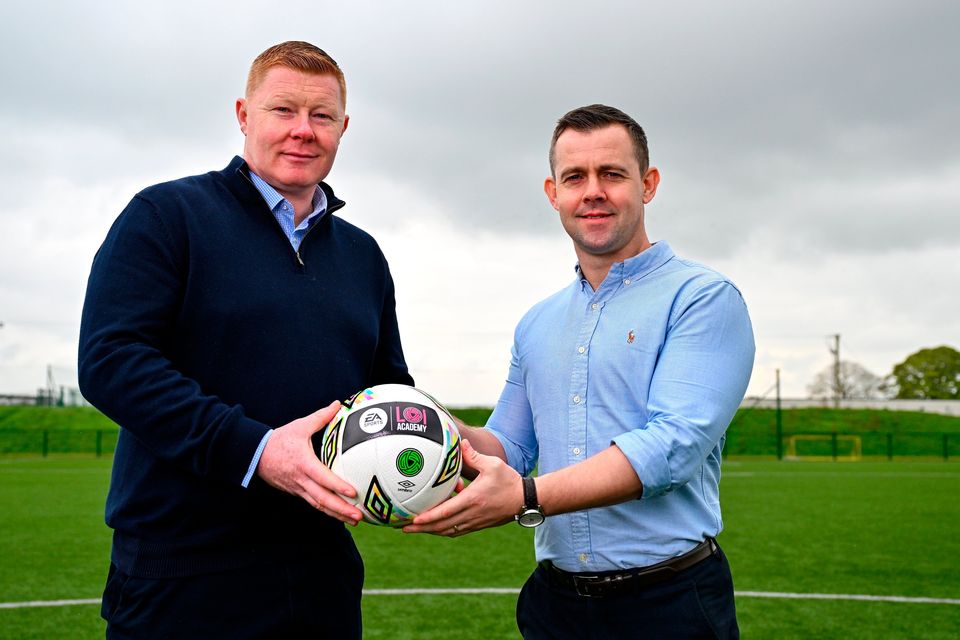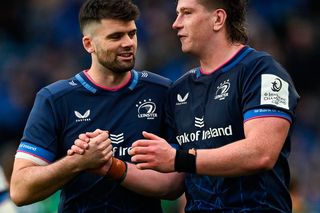‘Football has been overlooked for too long’ – Facts speak for themselves in drive for academy funding
LOI Development Manager Will Clarke, left, and FAI assistant director of football Shane Robinson pose for a portrait after an EA Sports LOI Academy media briefing
Slides to highlight the reason for a slide. The annual press conference hosted by Will Clarke, the FAI’s League of Ireland academy development manager, is one event where you’re guaranteed a level of truth.
Facts speak for themselves. Damien Duff’s refrain of ‘academies, academies, academies’ and their importance for the future of Irish football, including the fate of the senior international team, is grounded in reality.
Every year, Clarke paints a picture that is both accurate and deflating, explaining in simple terms that Ireland are going nowhere without addressing this issue.
There were a lot of elements to a presentation with 23 slides, but let’s narrow it down to three.
Clarke highlighted how many minutes Irish players played in the top five European leagues, an indicator of international success for all UEFA nations, has fallen dramatically over 20 years.
In 2002/03, there were 33 players enjoying a total of 46,880 minutes on the pitch. A decade later, it was 30 and 44,205. The most recent survey? Sixteen with a combined 9,818 minutes.
There have been a lot of changes since Ireland’s last World Cup appearance, with Brexit placing full responsibility for development in the hands of Irish clubs.
But the resources are not there to take on the job, to give players the contact hours with coaches that is necessary.
Consider this. At U-14 level, the difference in training hours for a kid at an Irish club and a counterpart at a Category 3 club in England (primarily League Two level) is just six minutes per week, an annual variance of 4 hours – in all of these examples, the English kid gets more of it.
At U-15 level, it jumps to 100 minutes and 70 hours. But the biggest rise is between there and U-17 level where youths at the lowest rung of the English professional ladder train for an extra 450 minutes per week. That’s 315 hours over the course of the year. Remember; we aren’t taking Category 1 and Category 2 into the equation here.
Only the handful of local based 16- to 18-year-olds good enough to be incorporated into the first team of senior League of Ireland sides – Mason Melia for example – are receiving anything comparable in terms of training time and that’s a very different kind of development.
Read more
Maybe it’s unfair to compare with the neighbour next door, so what about Europe? Clarke produced the most damning image of them all, confirmation that Ireland still has just 10 full-time staff spread across 24 academies. Poland has 376 across 16 clubs. Portugal has 315 spread across just seven academies. Croatia, often flagged as a relevant comparison because of a similar sized population, has 190 full-time academy staff across 10 clubs – their three-year gross profit driven by player sales stands at around €157m, a return on investment.
That would suggest Ireland has too many clubs and too few staff. Along with Northern Ireland, Andorra and Luxembourg, Ireland are one of just four countries in UEFA’s list with less than one full-time academy employee per club.
As it stands, the FAI can only afford to give €12,500 to every men’s League of Ireland club with a small travel grant on top of it. UEFA solidarity money of circa €1.4m is divided out too. In the women’s game, it’s €100,000 between ten clubs. That UEFA handout is due to increase to around €3m in the next cycle and the distribution may be tied in with meeting certain academy standards, but it’s still a considerable way off the €10m tally that Clarke estimates is necessary to have a chance.
A proposal was belatedly submitted to Government last November with outgoing CEO Jonathan Hill the point man. Given the purpose of his trips to Kildare Street in the months that followed, this is hardly encouraging.
After his presentation at FAI HQ, Clarke held a press conference that ran through a range of issues – extensive details about the age profile of LOI teams, the role of loanees from the UK, and tweaks to underage league rules. The summary is that the small number of people employed full-time in this vital area are making the best of what they can with pennies.
What happens if nothing changes?
“Ireland will always have good footballers despite the system,” said Clarke, who was previously employed by St Joseph’s Boys and is therefore well aware of the standpoint of traditional schoolboy clubs who want their role recognised.
“What we want to do is make sure that more kids have a better opportunity to fulfil their potential. We will have relative success on an ad hoc basis but there will be nothing sustained over a period of time.
“Football has to find its voice now because for too long we’ve been overlooked because we weren’t organised,” he continued, with a nod to election year.
“To be fair to LOI clubs and grassroots clubs, there are people working night and day to do the very best job that they can with two hands tied behind their back,” he asserted. “Things will just continue on as they are if we do not get the funding we need.”















